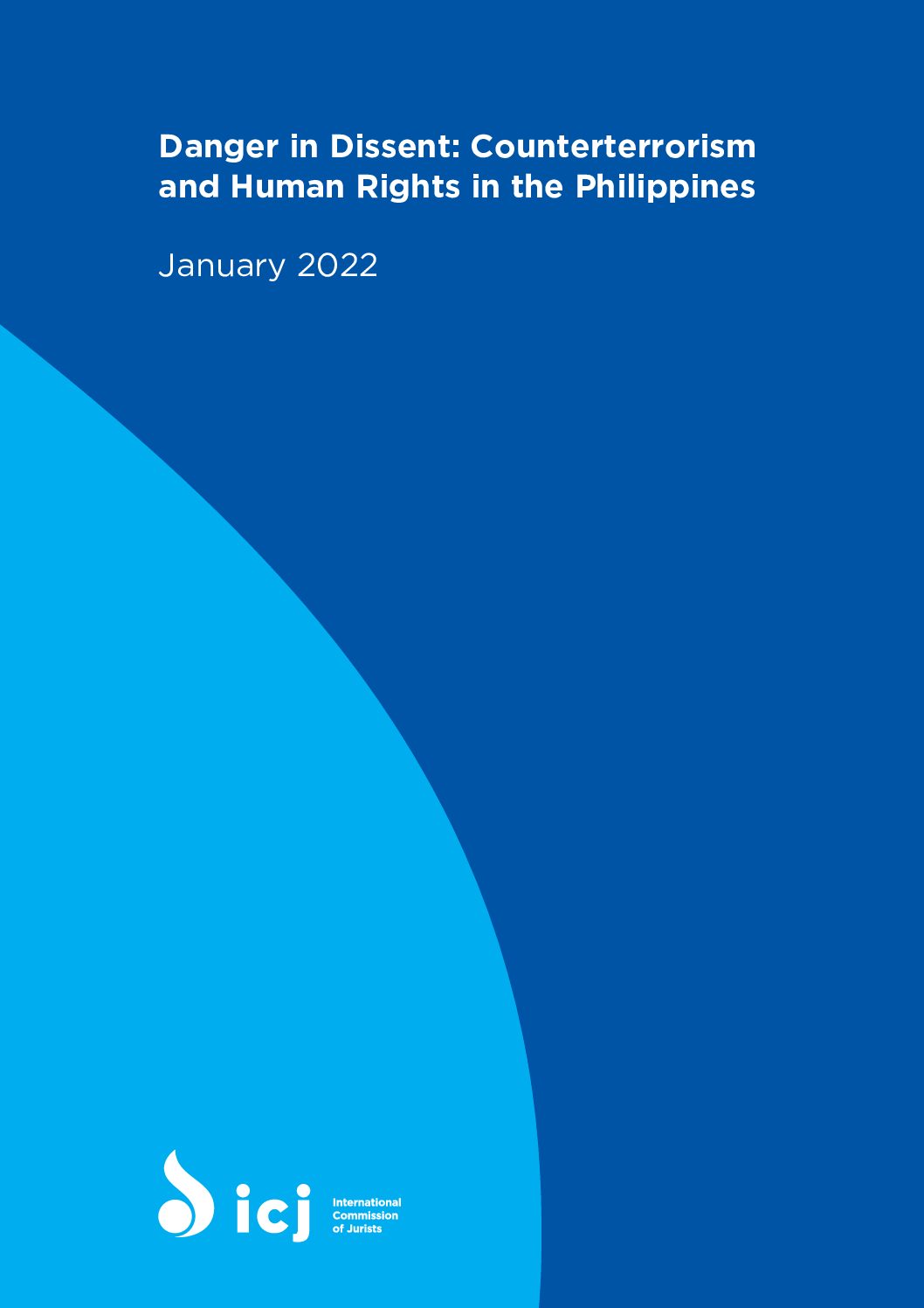The Philippine authorities must refrain from ‘red-tagging’ human rights defenders and activists, and amend the Anti-Terrorism Act of 2020 to conform with international human rights law and standards, the International Commission of Jurists (ICJ) said in a new legal briefing published today.
In the Philippines, State authorities have branded human rights defenders, labor leaders, public interest lawyers, journalists, political opposition, religious groups and other activists as “terrorists” and/or “communists” without substantial proof of any unlawful conduct, in a practice locally known as ‘red-tagging’.
The legal briefing, Danger in Dissent: Counterterrorism and Human Rights in the Philippines, underscores how this practice often has deadly consequences, with many of those red-tagged by State authorities being subsequently killed or injured by unidentified assailants. There is often no effective investigation and accountability for such killings or any accountability for the red-tagging by government officials.
“National security is never an excuse for violating human rights. The dangerous practice of red-tagging patently violates international human rights law and standards, including the rights to freedom of expression and information, life, liberty and security of the person, fair trial, and freedoms of association and peaceful assembly,” said Daron Tan, ICJ Associate International Legal Adviser.
The legal briefing highlights how the Anti-Terrorism Act of 2020, which may be used to further extend the practice of red-tagging, is incompatible with international human rights law and standards.
For instance, the Act contains an overbroad definition of terrorism, permits potentially unwarranted government surveillance and requests for data, and allows the arrest and detention of any person suspected of committing terrorist acts for up to 24 days without a judicial warrant, among other problematic provisions. Despite these flawed provisions, in December 2021, the Supreme Court of the Philippines upheld the constitutionality of most of the Act, only striking down two provisions of the Act.
The legal briefing also emphasizes the responsibility of social media companies to respect human rights, consistent with the UN Guiding Principles on Business and Human Rights, to the extent that the practice of red-tagging often takes places on social media platforms.
“Social media companies, like Meta, have not taken sufficient steps to counter red-tagging on its platforms that incites discrimination, hostility or violence, in order to prevent or mitigate adverse human rights impacts linked to their operations,” added Tan.
In light of the above concerns, the ICJ recommends that:
- National and local government officials must refrain from labeling human rights defenders as “terrorists”. Any credible accusations of terrorist conduct must be pursued through the rule of law, pursuant cognizable charges, compliance with due process and the right to a fair trial by a competent independent and impartial court;
- The Department of Justice and Office of the Ombudsman should investigate and if warranted prosecute individual government officials who engage in red-tagging in proper administrative and criminal proceedings;
- Congress should amend the Anti-Terrorism Act of 2020 in order to conform with international human rights law and standards pursuant to obligations under the ICCPR; and
- Social media companies should consistently observe their responsibility to respect human rights, consistent with the UN Guiding Principles on Business and Human Rights, including, but not limited to, taking further steps and increasing capacity to address red-tagging on its platforms inciting discrimination, hostility or violence; engaging with civil society before implementing policies impacting human rights; and applying the principles of transparency and due process in the moderation of online content on the platform.
Briefing Launch
The legal briefing will be launched at a virtual event. The launch will bring together diverse and leading independent voices to speak about the issue of red-tagging in the Philippines and the increasing assault on civic space in the Philippines. The launch will also discuss the significance of the December 2021 judgment of the Supreme Court on the constitutionality of the Anti-Terrorism Act 2020, and its implications for the practice of red-tagging in the Philippines.
The discussion will include as panelists:
- Daron Tan, Associate International Legal Adviser, International Commission of Jurists;
- Professor Theodore O. Te, Regional Coordinator, Free Legal Assistance Group Metro Manila and Assistant Professor, University of the Philippines College of Law; and
- Attorney Maria Kristina C. Conti, Associate, Public Interest Law Center and In-House Counsel, National Union of Peoples’ Lawyers.
Download
The legal briefing is available here. (PDF)
Contact
Daron Tan, ICJ Associate International Legal Adviser, email: daron.tan@icj.org





